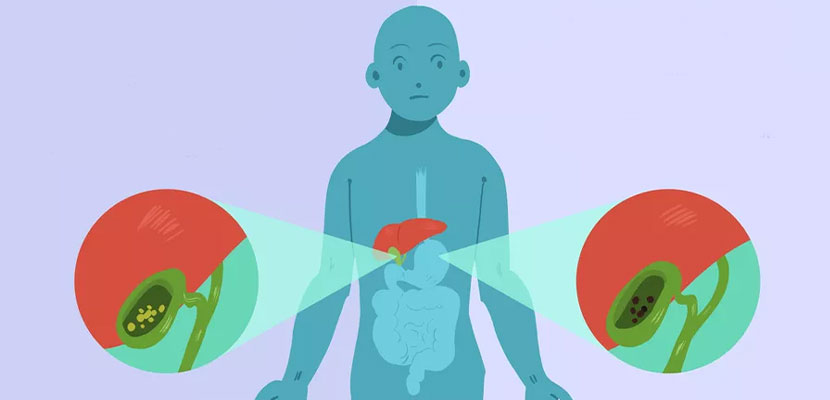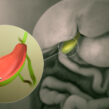Gall bladder stones are a common digestive disease found in 15 percent of people aged 50 years and above and 10% of the population worldwide. The usual treatment is surgery to remove the gall bladder. However, you do not need it if you do not have symptoms. Several misconceptions surrounding gallstones can be found on the internet/social media and are not entirely correct and can even be harmful.
In this article, we have tried answering some of the frequently asked questions and dispel some misconceptions about gall stones for you to make an informed choice.
Table Of Contents
- What are Gallstones?
- What Problems do Gall Stones Cause?
- What are my chances of getting Gallstones?
- Can I drink plenty of water to flush my Gall Stones?
- Are there any alternative medicines that I can try out first (Ayurvedic/Homeopathy/
Unani)? - Do all Gallstones need Treatment?
- Will there be any complications if I decide to retain my gall bladder and remove only gall stones?
- How are Gallstones Treated?
- What health problems should I expect after going through the gall bladder surgery?
- Before deciding on surgery should I consider a second opinion?
- Reach us
What are Gallstones?
Gall stones are pebble-like deposits made of cholesterol, bilirubin, or calcium salts, usually as a mixture formed inside your gall bladder. These stones can vary from a rice grain to a golf ball in size and numbers.
Usually, gall stones are of two types:
- Cholesterol stones– The more common type occurs when the liver produces excess cholesterol.
- Pigment stones— These are rare and contain bilirubin salts. They are more frequent in patients with liver cirrhosis, biliary tract infections, or certain blood disorders.
What Problems do Gall Stones Cause?
Pain in the belly, under the rib cage, and at the back of the right shoulder is the main symptom people will experience. Along with pain, a person can also have vomiting and nausea. Pain that occurs after eating a fatty meal can last for several hours. However, if the pain is due to an inflamed gall bladder, it can be longstanding and may also lead to jaundice and fever.
What are my chances of getting Gallstones?
You are more likely to develop gall stones if you:
- Are a woman
- Are over the age of 40 years
- Are obese
- Eat a high-fat diet
- Are pregnant
- Have diabetes
- Lose weight quickly
- Have a family history of gall bladder stones
- Take medicines for contraception or hormone replacement
- Take cholesterol-lowering drugs
Can I drink plenty of water to flush my Gall Stones?
Gallstones are not the same as kidney stones. Unlike kidney stones, which form within the kidneys and can be flushed in urine with sufficient water intake, gall stones form inside the gall bladder under your liver. Consequently, drinking plenty of water does not help you remove gallstones and can even lead to an emergency trip to the hospital if you are already in pain.
Are there any alternative medicines that I can try out first (Ayurvedic/Homeopathy/
Unani)?
Currently, according to scientific data, no alternative medicine is available to help you remove the gallstone. But, your risk of having serious complications such as acute cholecystitis, jaundice, cholangitis, pancreatitis, gangrene, gall bladder cancer, and other gall bladder diseases may increase by 1-3% in the next decade after diagnosis. So, removing your gall bladder (cholecystectomy) is the only viable option.
Do all Gallstones need Treatment?
Silent gall stones usually do not require any treatment. But, if you have asymptomatic gall stones larger than 3 cm in size or incidentally diagnosed during the physical examination of other medical conditions, your doctor may remove your gall bladder to avoid any future complications.
Will there be any complications if I decide to retain my gall bladder and remove only gall
stones?
Stones in the gall bladder are a sign of poor health. So, most people with gallstone symptoms will go through surgery. However, your doctor may elect for nonsurgical treatment when you have medical conditions that prevent surgery. These methods include:
- Endoscopic retrograde cholangiopancreatography (ERCP)
- Oral dissolution therapy
- Shock wave lithotripsy
However, bear in mind, the above methods are for removing cholesterol stones alone, which may recur after several months despite your subsiding symptoms, forcing you to take regular gallstone treatment for a long time.
How are Gallstones Treated?
Surgery to remove the gall bladder is called a cholecystectomy. It is the standard treatment for gallstones and performed in two ways:
- Open surgery: When your gall bladder is inflamed, infected, or scarred from other previous operations, open surgery is the option. It is also useful when laparoscopic surgery isn’t possible. You may have to stay in the hospital for a week and may be able to resume your daily activities after about a month.
- Laparoscopic surgery: Laparoscopic surgery for gallstones is the most used method for removing the gall bladder because:
1. it can be performed on an outpatient basis
2. Requires three small incisions, so less scarring
3. Less post-operative pain
4. Less medication
5. Hospitalization is only 1–2 days
6. Speedy recovery time
What health problems should I expect after going through the gall bladder surgery?
The gall bladder is an organ that is not indispensable. Its primary function is to store the bile juice, a fluid that aids digestion. In most people, the removal of the gall bladder does not cause any serious digestive problems. However, a few will continue to experience many original complaints, including diarrhea, heartburn, stomach pain, gas, and bloating, that can be treated with medication after proper consultation with a doctor.
Before deciding on surgery should I consider a second opinion?
The gallstone symptoms are not typical and are also common to other medical conditions. Taking a second opinion from a reliable source, therefore, can make a big difference before you make an informed choice.
Reach us
If you are looking for an effective treatment for gall bladder stones, then get in touch with us via email or phone call. Our specialist, Dr. Parthasarathy is one of the most renowned surgical gastroenterologists in Hyderabad, India. He has about 15 years of experience and has performed 3000+ advanced laparoscopic procedures, also he performs more than a hundred successful surgeries for gall bladder every year.



